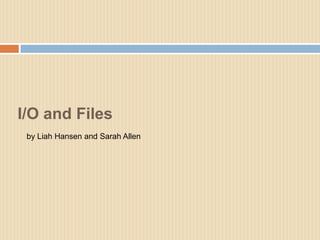
Ruby File I/O
- 1. I/O and Files by Liah Hansen and Sarah Allen
- 2. IO: Input/Output IO class is the basis for all input and output in Ruby IO objects represent readable and/or writable connections to disk files, keyboards & screens File is a subclass of IO and allows for reading and writing files in ruby
- 3. common modes for opening I/O ports "r" Read-only, starts at beginning of file (default) "r+" Read-write, starts at beginning of file "w" Write-only, truncates existing file to zero length or creates a new file for writing "w+" Read-write, truncates existing file to zero length or creates a new file for reading and writing
- 4. open a file Creating the file object opens the file: >> f = File.new("abc.rb") => #<File:abc.rb>
- 5. open file – with a block File.open is synonomous with File.new, except that it can take a block: >> File.open(“abc.rb", "r+") do |f| f << "hello" end => #<File:abc.rb (closed)>
- 6. read a file return a single line >> f.gets => "aaa" return the whole file after current position >> f.read => "aaabbbccc" returns file as an array of lines >> f.readlines => ["aaa", "bbb", "ccc"]
- 7. position & rewind >> f.rewind => 0 >> f.pos => 0 >> f.gets => "aaa" >> f.pos => 4
- 8. iterate over lines File objects are enumerable: >> f.each {|line| puts line} aaa bbb ccc
- 9. use any enumerable method >> f.map {|line| line.chomp + "... "} => [”aaa... ", ”bbb... ", ”ccc... "] >> f.any? {|line| line =~ /aaa/ } => false >> f.rewind => 0 >> f.any? {|line| line =~ /aaa/ } => true
- 10. write to a file “w+” argument >>my_file= File.new("data.txt", "w+") => #<File:def.rb> >> my_file.write("something") => 9 >> my_file.rewind => 0 >> my_file.read => "something"
- 11. directories >> d = Dir.new("/Users/liahhansen/s/dir") => #<Dir:/Users/liahhansen/s/dir> >> d.entries => [".", "..", "abc.rb", "anothersubdir", "def.rb", "ghi.rb", "subdirectory"]
- 12. count files in directory >> i=0 => 0 >> d.each {|x| i+=1; puts i} 1 2 3 4 5 6 7
- 13. iterate over files in directory >> ruby_files = Dir["*.rb"] => ["abc.rb", "def.rb", "ghi.rb"] >> ruby_files.map do |file| "rb_" + file end => ["rb_abc.rb", "rb_def.rb", "rb_ghi.rb"]
Editor's Notes
- The File class is a subclass of the IO class
- rewind
